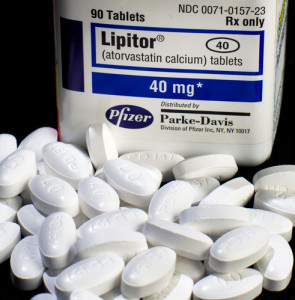Changes in Advice for LDL Cholesterol Could Mean More Americans Treated with Statins like Lipitor

Previously, doctors would treat patients who had a greater risk of cardiovascular disease with statins when their cholesterol hit a certain level. That notion, along with the notion of “bad cholesterol,” is being changed, which means a wider variety of people – many of whom are still healthy, and who follow healthy diets – could be put on statin drugs as a preventative measure. Instead of using a specific “bad cholesterol” range to treat all patients, doctors are encouraged to have a “risk calculator” instead, in which the doctor considers the patient’s age, gender, cholesterol levels, blood pressure, smoking history, diet, weight, and other variables to prescribe a statin drug.
The new recommendations focused on using statins like Lipitor as a prevention tool, which previous research has shown to be effective, although it puts patients at risk of other diseases.
A study published last year by Brigham and Women’s Hospital showed that statin use increased the risk for a patient to develop Type 2 diabetes, which can increase the risk of heart disease. The study analyzed specific data from the JUPITER trial (Justification for the Use of Statins in Primary Prevention), which focused on the statin Crestor as a preventative treatment in healthy people. The study found that statins were highly effective in preventing heart disease in people who had no current heart problems or high cholesterol, but who had high levels of a marker for heart disease, CRP (C-reactive protein). Statins had been used to treat people with existing heart problems or high cholesterol, to prevent heart attacks and stroke. The new findings of the JUPITER study meant that the FDA expanded the potential patient base, so millions of Americans began taking the drug, in concert with quitting smoking, increasing exercise, and eating healthier food, to prevent heart disease.
The follow-up study showed that patients who had an increased risk of developing Type 2 diabetes were more likely to develop the condition when using statins like Lipitor and Crestor.
In 2012, the FDA forced label changes for Lipitor and other statins include a warning about the potential increased risk of diabetes. The warnings added by Pfizer to the prescription bottles for Lipitor failed to completely and adequately address the increase in risk of diabetes and the importance of monitoring blood glucose levels. As a result, thousands of women may have developed diabetes after taking Lipitor.
The new guidelines downplay the risk of other diseases – not only could patients on statins like Lipitor develop Type 2 diabetes, they could also suffer muscle aches, fatigue, a toxic breakdown of muscle tissue called rhabdomyolysis, and hemorrhagic stroke.
“Statins treat risk, not only cholesterol,” said Dr. Neil Stone, chief author of the new clinical practice guidelines, and a cardiologist and professor at Northwestern University’s Feinberg School of Medicine. “They lower risk by lowering cholesterol.” However, he did acknowledge that clinical studies had not been able to prove that lowering cholesterol to a specific target range translated into fewer heart attacks or strokes related to arterial blockages.
Currently, between 15 and 30 million Americans take statin drugs, such as Lipitor, Crestor, or generic versions. With the new guidelines, the number of patients on statins could increase beyond 30 million.
“It may be there are a substantial number of patients now on statin therapy where there is not strong evidence of benefit,” Dr. Sidney Smith of the University of North Carolina, one of the guideline writers, said. “The new guidelines will treat better and smarter, focusing on populations most likely to benefit.”
The Strom Law Firm Is Now Investigating Lipitor Cases
Although many doctors believe that the benefits of statins such as Lipitor outweigh the risks, patients who are otherwise healthy disagree. Type 2 diabetes carries the risk of a wide variety of different side effects, including increased risk of heart and blood vessel disease, nerve damage or neuropathy, kidney damage, osteoporosis, Alzheimer’s disease, skin and mouth conditions, and diabetic macular edema, which can lead to blindness.
The attorneys at the Strom Law Firm are currently investigating claims that taking Lipitor is related to development of Type 2 diabetes. There may be a limited time to file a claim, so contact us today for a free consultation. 803.252.4800

